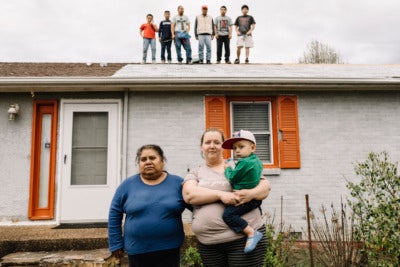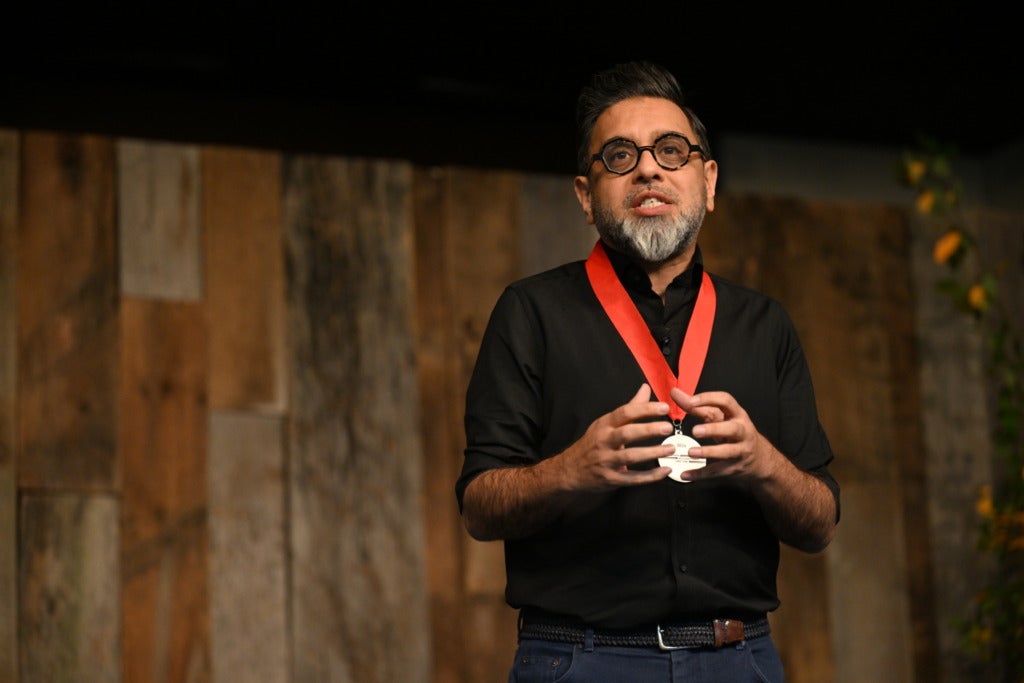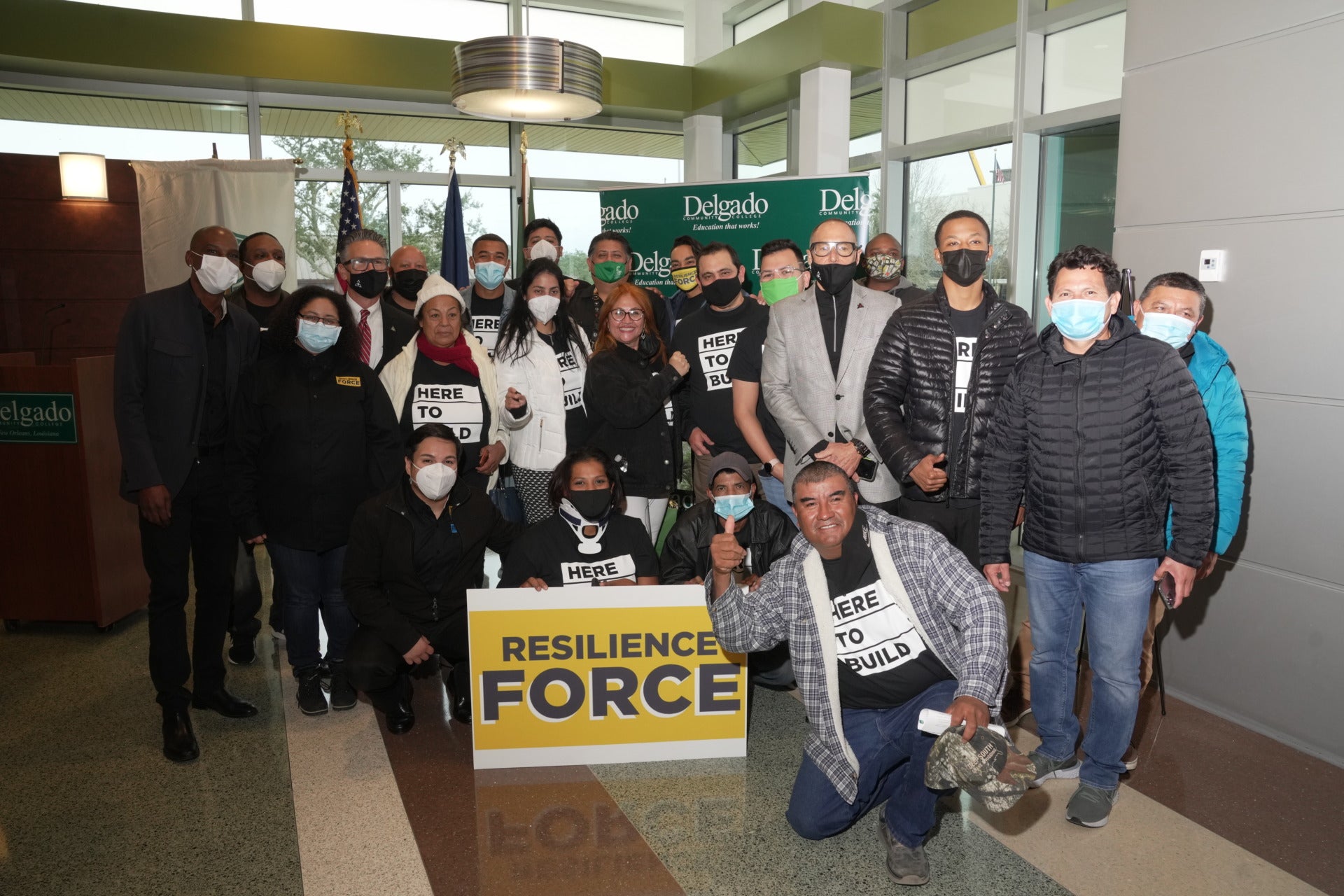
Cookeville, TN – Lucia Padilla (L) and Brandy Andres stand for a portrait in front of Ms. Padilla’s house, which sustained damage after severe storms and at least one tornado slammed through central Tennessee, killing 24 people and wrecking hundreds of buildings hours before dawn on Tuesday, March 3, 2020.
Natural disasters like floods, fires, and hurricanes leave behind devastating destruction, displacing families and requiring immense efforts to rebuild. The skilled workers who take on this critical task—repairing homes and restoring communities—often face exploitation, subjected to low wages and even human trafficking. Recognizing this harsh reality, labor organizer Saket Soni, a Job Quality Fellow at the Aspen Institute Economic Opportunities Program, saw the need for a resilient workforce to match the needs of disaster-stricken communities and make America resilient. This insight led him to found Resilience Force, an organization dedicated to training, supporting, and protecting the thousands of mostly immigrant workers who travel to rebuild and repair homes in the wake of natural disasters
Resilience Force is more than just a response to immediate disaster needs; it represents the creation of a new American profession that is urgently needed as climate-related disasters become more frequent and severe. Through a combination of advocacy and training, Resilience Force is setting new standards for fair pay, safety, and dignity in disaster recovery work. The organization’s achievements, such as raising wages to $35 an hour, securing $1 million to train workers in wildfire and agricultural resilience, and establishing training programs in key states like Florida, California, and Louisiana, are paving the way for a national model that ensures workers are treated with the respect and fairness they deserve.
Celebrating the impact of the Resilience Force, Saket Soni was named a 2024 John P. McNulty Prize Winner at the 2024 Resnick Aspen Action Forum. We had the opportunity to sit down with him to discuss his groundbreaking work during the event. In this Q&A, Saket shares the pivotal moments in his leadership journey, the lessons he learned while working with diverse communities, and his vision for a future where the resilience of both our communities and the workforce that rebuilds them are prioritized and protected.

Saket Soni, Founder & CEO of Resilience Force, speaks at the 2024 Resnick Aspen Action Forum in Aspen, CO, on Tuesday, July 23, 2024. [Photo by Dan Bayer]
Was there a pivotal moment in your leadership journey that inspired you to take on this challenge?
A pivotal moment in my leadership journey was when I got to New Orleans after Hurricane Katrina hit in 2005. I came as a volunteer, a relief worker intended to stay 10 days–10 years later, I was still there. I was a labor organizer at the time. I saw firsthand that the entire Gulf Coast had been turned into America’s largest construction site. The repairs were being carried out mostly by immigrant workers, workers from around the United States and across the world, who were repairing the millions of homes that were damaged after Hurricane Katrina. Just watching how that rebuilding process was happening woke me up and changed my life.
What impact have you seen so far?

We’re living at a time when disasters are becoming increasingly frequent and destructive because of climate change. Hurricanes, floods, and fires hit harder year after year, and thousands, if not tens of thousands of families lose their homes. Millions of homes are damaged. So there’s a need to not just repair after disasters, but also to prepare for the storms that are coming so that we can get through them stronger. That’s where our workers come in.
There’s a rising agreement that we need resilience. Everybody’s talking about resilience now, but most people mean engineering or spiritual reserves of strength. That’s all true. But we also need the workers who are building our resilience by making our homes capable of surviving the storms that are about to happen, that may come a day after tomorrow. That’s the impact we’re having. Our members are the skilled workers who are forming a huge professional workforce that we call the resilience workforce. And they’re coming in rebuilding, repairing, and preparing us for the climate change era.

Working alongside the community you serve has been key to creating effective solutions. How has community partnership influenced your approach and impact?

Resilience Force is rebuilding homes after disasters, but we’re also building one other important thing: social cohesion. We’re rebuilding the civic fabric that our democracy needs at this time. So when our members come off roofs, they often receive hugs of gratitude and affection for the work they’ve just carried out. The people hugging them are homeowners and renters. They’re often people who right before the hurricane saw immigrant workers as the enemy. So what’s happening is the building of new bonds between immigrants and residents who didn’t think they wanted to be in a relationship with immigrant workers.
Our work is to turn these spontaneous moments into the basis of long-lasting friendships. Friendships that can start to weave a new fabric of civic life in the country. In a lot of the places we go – Florida, Louisiana, Kentucky, and places in the Midwest – there are these communities that are stepping into an entirely new relationship with immigrant workers. And as we build this workforce, it’s not just immigrants, it’s Black, white, brown, Native American, and Asian American workers, it’s men and women. It’s the formerly incarcerated, those who have been unemployed for long periods. We’re building a new starting point for America, rebuilding relationships, and building new bonds with people who never thought they’d be in a relationship with one another.

Working across divides, whether political or cultural, working closely with people who hold perhaps very different opinions–often it all starts with one meal. We usually put together a meal where immigrant workers and the residents who are rebuilding homes sit and engage with one another. And as they break bread, they start to tell their life stories. That storytelling reveals people to each other in a different way. They start to see each other perhaps not as the same, but at least more similar than when they started. And that’s the beginning of a relationship. That’s the beginning of a bond. A lot of times people aren’t just talking about differences. They’re discussing the ways they’re similar, the shared priorities in their lives, and the common struggles they’ve both faced. That’s how it all starts.
In reflecting on the theme for the Action Forum this year – Only Light Can Do That – what do you find sustains you personally? What gives you hope or resilience in times of challenge?
What gives me hope every day is that even in the aftermath of hurricanes, floods, and fires—in both our personal lives and communities—there are these profound openings even in the context of tragedy and loss. These moments allow people to change their minds, open their hearts, and form unexpected relationships. This hope fuels my belief in the resilience of our country, our communities, and myself, giving me the strength to carry on.

Members of the Resilience Force pose for a photo in New Orleans, LA, on Monday, Feb. 07, 2022. [Photo by Josh Brasted/Getty Images for Resilience Force]
The road to impact is long and winding. What’s been your biggest learning around your own leadership in building your organization? What advice do you have for other leaders in similar roles?
The best advice I ever received is also the advice I would share. There was a time–after Hurricane Katrina– when I was feeling very, very low about the state of our country. Witnessing the exploitation of immigrant workers during recovery efforts left me disheartened. I turned to my mentor, Dr. Vincent Harding, who had counseled Dr. Martin Luther King. He told me two things I’ll never forget:
First, you’ve got to get some sleep. That’s my advice too, though I admit I don’t always follow it well.
Second thing he said to me was, America is a country that is still being born.
And that made me understand my role as an organizer differently. Places of hurt and pain aren’t where hope is dying. Places of hurt and pain are where hope is being born. And our job right now is to find that hope, nurture it, recover it, and let it light up the world.
Learn more about Resilience Force’s work in the mini-documentary created by Freethink and the McNulty Foundation.
About the John P. McNulty Prize: Created in 2008 by Anne Welsh McNulty in honor of her late husband, the Prize in partnership with the Aspen Institute awards $150,000 to each winner, along with support to elevate their efforts. The winners are selected by a distinguished international jury, which includes leaders like Darren Walker, Cheryl Dorsey, Olara Otunnu, and Brizio Biondi-Morra.
About the Aspen Global Leadership Network: The Aspen Global Leadership Network (AGLN) is a dynamic, worldwide community of nearly 4,000 entrepreneurial leaders from over 60 countries. Spanning business, government, and the nonprofit sector, these leaders share a commitment to enlightened leadership and the drive to tackle the most pressing challenges of our times. Through transformative fellowships and gatherings like the Resnick Aspen Action Forum, AGLN Fellows have the unique opportunity to connect, collaborate, and challenge each other to grow and make a meaningful impact.
More on the Resnick Aspen Action Forum: Under the theme “Only Light Can Do That,” inspired by Dr. Martin Luther King Jr., the 2024 Resnick Aspen Action Forum was an invitation for leaders to reflect on finding resilience and hope during challenging times and discovering common ground despite differing views. Explore more inspiring content on leadership and change-making from the Action Forum here.

